Former Mohawk Trail ski coach, Rowe park manager sued for alleged sexual assault of former student

The Franklin County Justice Center in Greenfield. STAFF FILE PHOTO/PAUL FRANZ
| Published: 03-26-2025 11:49 AM |
ROWE — A former Mohawk Trail Regional School ski coach and Rowe park manager is being sued for allegedly sexually assaulting a student from 2016 to 2019.
A civil complaint filed in Franklin County Superior Court alleges that Sean Loomis, while serving as park manager for the Rowe Park Commission and head coach for Mohawk Trail Regional School’s boys ski team, used his authority to coerce the plaintiff into a sexual relationship when she was a minor and repeatedly assaulted her between 2016 and 2019. In his answer to the complaint, Loomis has denied all of the allegations.
The plaintiff is suing under five counts: sexual abuse of a minor, sexual assault, sexual battery, negligent infliction of emotional distress and false imprisonment. She is requesting a jury trial.
The plaintiff’s attorney, James M. Merrigan, of Boston, said his client, a woman now in her mid-20s, was a student at Mohawk Trail Regional School, a member of the girls ski team and worked at Pelham Lake Park in Rowe, which gave Loomis, now 51, direct access and authority over her. As a matter of policy, the Greenfield Recorder does not identify victims or alleged victims of sexual assault.
Pittsfield attorney Joshua C. Hochberg, whose law firm represents Loomis, told the Recorder that Loomis denies the allegations. He declined to comment further.
Loomis resigned from his position as park manager last June after 22 years in the role. Additionally, his contract to be the ski coach for Mohawk Trail was not renewed for the 2024-2025 school year.
The civil complaint alleges Loomis began pursuing the plaintiff in 2014, when she was 13 years old. He allegedly sent her numerous unwanted sexually explicit text messages, made inappropriate comments and invaded her social life, activity that later evolved into unwanted touching and eventually coerced sexual acts, the complaint alleges.
“Between the years 2014 and 2019, the defendant, Sean Loomis, utilized his position of authority over the plaintiff as her ski trainer and manager to sexually assault, sexually batter, sexually abuse and rape her on numerous occasions,” the complaint alleges.
Article continues after...
Yesterday's Most Read Articles
 The ills of a billion-dollar enterprise: The slow-death of the cannabis industry, and what might be done to reverse the trend
The ills of a billion-dollar enterprise: The slow-death of the cannabis industry, and what might be done to reverse the trend
 Sex assault complaint spurs review at Mohawk Trail Regional School District
Sex assault complaint spurs review at Mohawk Trail Regional School District
 Greenfield Fire Station’s energy use 250% higher than expected
Greenfield Fire Station’s energy use 250% higher than expected
 Former Mohawk Trail ski coach, Rowe park manager sued for alleged sexual assault of former student
Former Mohawk Trail ski coach, Rowe park manager sued for alleged sexual assault of former student
 Franklin Tech English teacher honored for bringing ‘the very best’ out of students
Franklin Tech English teacher honored for bringing ‘the very best’ out of students
 Real Estate Transactions: March 28, 2025
Real Estate Transactions: March 28, 2025
It goes on to say that Loomis requested that the plaintiff meet him at an office at Pelham Lake Park under the guise of team-related activities, invited her to tune her skis or work out, and then assaulted her there, as well as at his home in Rowe. Loomis denies not only the assaults but also the claim that he invited her to the park office.
The count of false imprisonment arises from the plaintiff’s allegation that, on multiple occasions, Loomis restrained the plaintiff and held her against her will.
The complaint does not state a specific amount being sought in damages. According to Merrigan, that will be determined later and ultimately will be up to a jury.
“It boils down to, what occurred was against her will. … It’s not about the medical bills,” Merrigan said.
State Police investigated the case last spring after the young woman came forward and told her family what had happened. According to Merrigan, the Northwestern District Attorney’s Office decided that the evidence was insufficient to support a criminal prosecution.
“They determined they didn’t have enough probable cause to investigate and file charges,” he said. “This has been an ongoing dilemma because the burden of proof is on the district attorney and there has to be beyond probable cause. So we’re suing him civilly.”
Merrigan said that because his client was 16 years old when Loomis is alleged to have first sexually assaulted her, she was of the age of consent in Massachusetts. In a criminal trial, the DA’s office would have to prove beyond a reasonable doubt that the relationship was not consensual.
The Northwestern District Attorney’s Office spokesperson Laurie Loisel declined to confirm or deny any investigation into Loomis or answer questions about the case.
Michael D’Isola, director of Jeffrey Glassman Injury Lawyers in Boston, who is not involved in the case, explained that to pursue criminal charges, district attorneys must first prove probable cause. To get a conviction in court, they must then prove a crime occurred beyond a reasonable doubt.
“Probable cause is the lowest threshold of proof needed: Is it more likely than not a crime was committed?” D’Isola said. “If they don’t feel they have that level of proof, they’re not going to go forward because then in court they have to prove beyond a reasonable doubt.”
Sexual assault cases are tricky, D’Isola said. Factors such as age, the point in time the alleged abuse occurred and when the alleged abuse was reported can all play a role in whether a district attorney pursues a case. Sometimes a district attorney has enough evidence to prove probable cause, but does not believe there is enough to win in court, so they do not try to pursue charges. This does not necessarily mean abuse or assault did not occur, D’Isola said, but over time witness memory fades and physical evidence may be lost, which can result in not enough evidence being available to prove beyond a reasonable doubt that a crime occurred.
D’Isola explained civil complaints are different than criminal ones because in a civil case the plaintiff only has to prove it was more likely than not that a crime occurred. While criminal complaints are about determining guilt and imposing criminal penalties, civil complaints seek monetary damages.
A 2022 study from University of Massachusetts Lowell professors in psychology and criminology found that less than one in five reported cases of child sexual abuse leads to prosecution. A similar study by the same team in 2019 found that of 100 sexual assaults of teenage girls and young women, only 18 resulted in an arrest, and even fewer, less than 7%, resulted in conviction.
Under Massachusetts General Law, Chapter 260, Section 4C, minor victims can sue their abusers civilly within 35 years of when the acts occurred or within seven years of when the plaintiff discovered, or reasonably should have discovered, “that an emotional or psychological injury or condition was caused by said act.”
Reach Madison Schofield at 413-930-4579 or mschofield@recorder.com.






 Avery’s General Store building in Charlemont for sale
Avery’s General Store building in Charlemont for sale Farm owners learn the importance of succession planning at Shelburne workshop
Farm owners learn the importance of succession planning at Shelburne workshop Tax amendment could safeguard state’s small farms
Tax amendment could safeguard state’s small farms Four collection weekends planned for Styrofoam in four Franklin County towns
Four collection weekends planned for Styrofoam in four Franklin County towns
